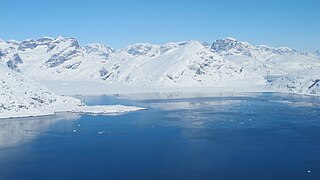
Myggbukta, meaning "Mosquito Bay" in Norwegian, was a Norwegian whaling, meteorological and radio station located on the coast of Eastern Greenland in present-day King Christian X Land.
Buskø was a small Norwegian sealer, seized by the U.S. Coast Guard in East Greenland in September 1941, before U.S. entry into the war. She was bringing supplies and rotating personnel for the Norwegian hunting stations there. The episode is notable not only for the uproar in the American press when Buskø was towed to Boston as a prize, but also because it is frequently but incorrectly listed as being the first American capture of an enemy surface vessel in the war. Finally, President Franklin D. Roosevelt had frequently asserted that Germany would attempt to establish a foothold in Greenland, and the way this episode was presented seemed to bear him out. The affair was a notable early initiative in the North Atlantic weather war.

Skjoldungen is a large uninhabited island in the King Frederick VI Coast, southeastern Greenland. Administratively it is part of the Sermersooq municipality. The weather of the island is characterized by tundra climate.

Kangerlussuaq Fjord is a fjord in eastern Greenland. It is part of the Sermersooq municipality.
Lindenow Fjord or Kangerlussuatsiaq, is a fjord in the King Frederick VI Coast, Kujalleq municipality, southern Greenland.

King Frederick VI Coast is a major geographic division of Greenland. It comprises the coastal area of Southeastern Greenland in Sermersooq and Kujalleq municipalities fronting the Irminger Sea of the North Atlantic Ocean. It is bordered by King Christian IX Land on the north and the Greenland Ice Sheet to the west.
Thorland is a peninsula in the King Frederick VI Coast, southeastern Greenland. It is a part of the Sermersooq municipality.

Fridtjof Nansen Land was a suggested but not officially adopted Norwegian name of a territory on the southern East Coast of Greenland, that was proclaimed by Norway on July 12, 1932, and occupied until April 5, 1933. It was named after Norwegian polar explorer Fridtjof Nansen. The short-lived territory occupied much of King Frederick VI Coast, which had been claimed a century before by the Danish crown.
Nanuuseq Fjord, old spelling Nanûseq, is a fjord in the King Frederick VI Coast, Kujalleq municipality, southern Greenland.

The 1932–33 East Greenland Expedition, sub-titled the Pan Am expedition by some sources, was a small expedition to Greenland led by Henry "Gino" Watkins until his death and then by John Rymill. The expedition was intended to continue the work of the previous British Arctic Air Route Expedition (BAARE) that had mapped unexplored sections of Greenland in 1930–1931.

The Denmark expedition, also known as the Denmark Expedition to Greenland's Northeast Coast, and as the Danmark Expedition after the ship, was an expedition to the northeast of Greenland in 1906–1908.

Mørkefjord, meaning in Danish "The dark fjord," is a fjord in King Frederick VIII Land, northeastern Greenland.

Antarctic Haven is a bay in King Christian X Land, Northeastern Greenland.

Jonsbu was a Norwegian hunting and radio station located on the coast of Eastern Greenland in present-day King Christian X Land.
Torgils Orrabeinfostre is the Viking hero of Flóamanna saga.

Torgilsbu was a Norwegian hunting, meteorological and radio station located on the King Frederick VI Coast, Southeastern Greenland.

Storfjord was a Norwegian hunting, meteorological and radio station ("Storfjord/LMR") located in King Christian IX Land, Eastern Greenland.
Graah Fjord, also known as Devold Fjord and Langenæs Fjord, is a fjord in King Frederick VI Coast, eastern Greenland.

Hallvard Ophuus Devold was a Norwegian Arctic explorer, trapper and meteorologist. He was instrumental in the attempt to establish Eric the Red's Land in 1931. His brother Finn Devold (1902–1977) shared his vision and helped to establish a Norwegian station at Finnsbu, SE Greenland.

Finn Devold was a Norwegian Arctic explorer, marine biologist and meteorologist. His father was parish priest Harald Ophus Devold. Together with his brother Hallvard Devold, Finn shared an interest in the Arctic areas and in the expansion of Norwegian sovereignty across Greenland.













